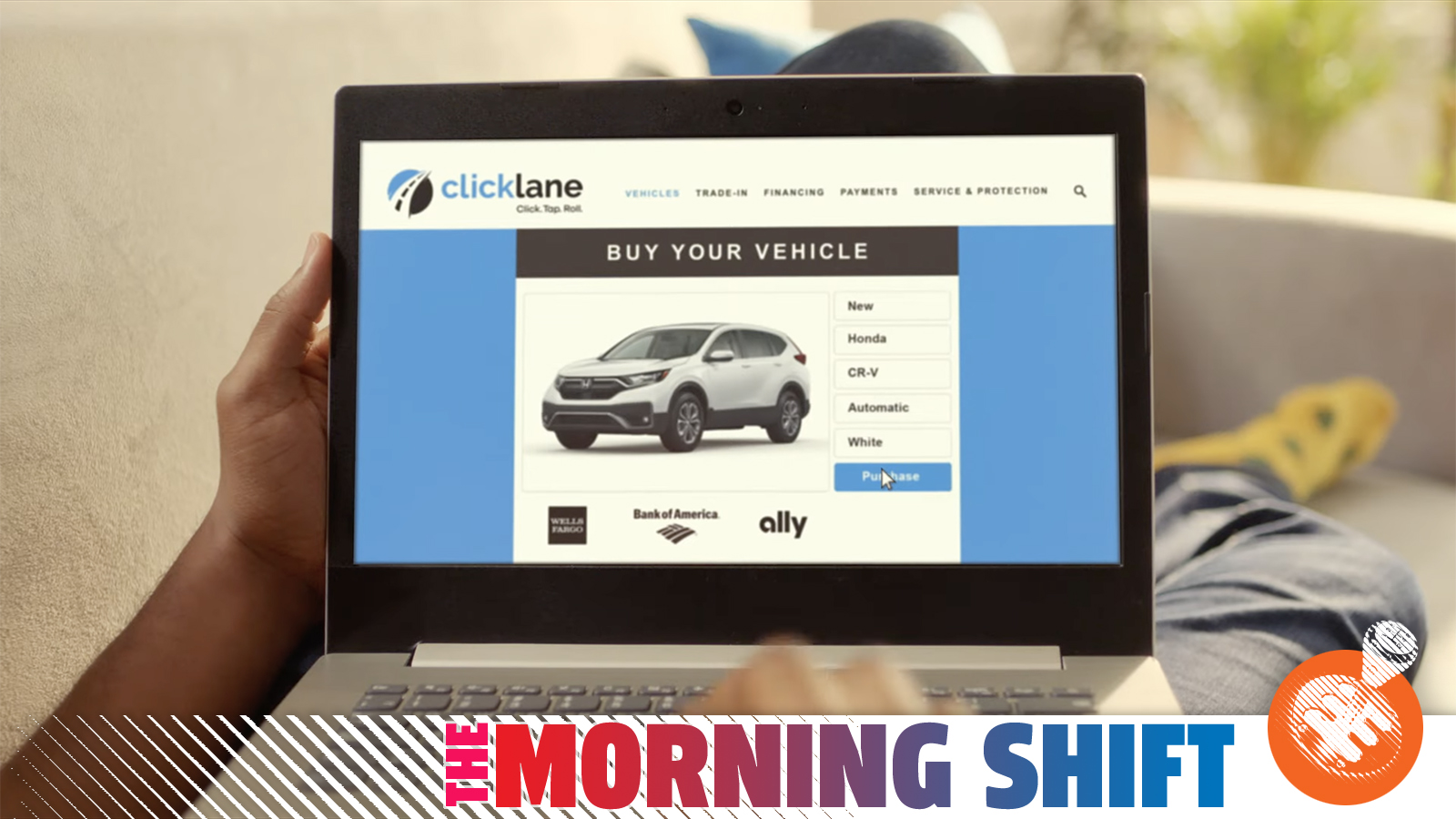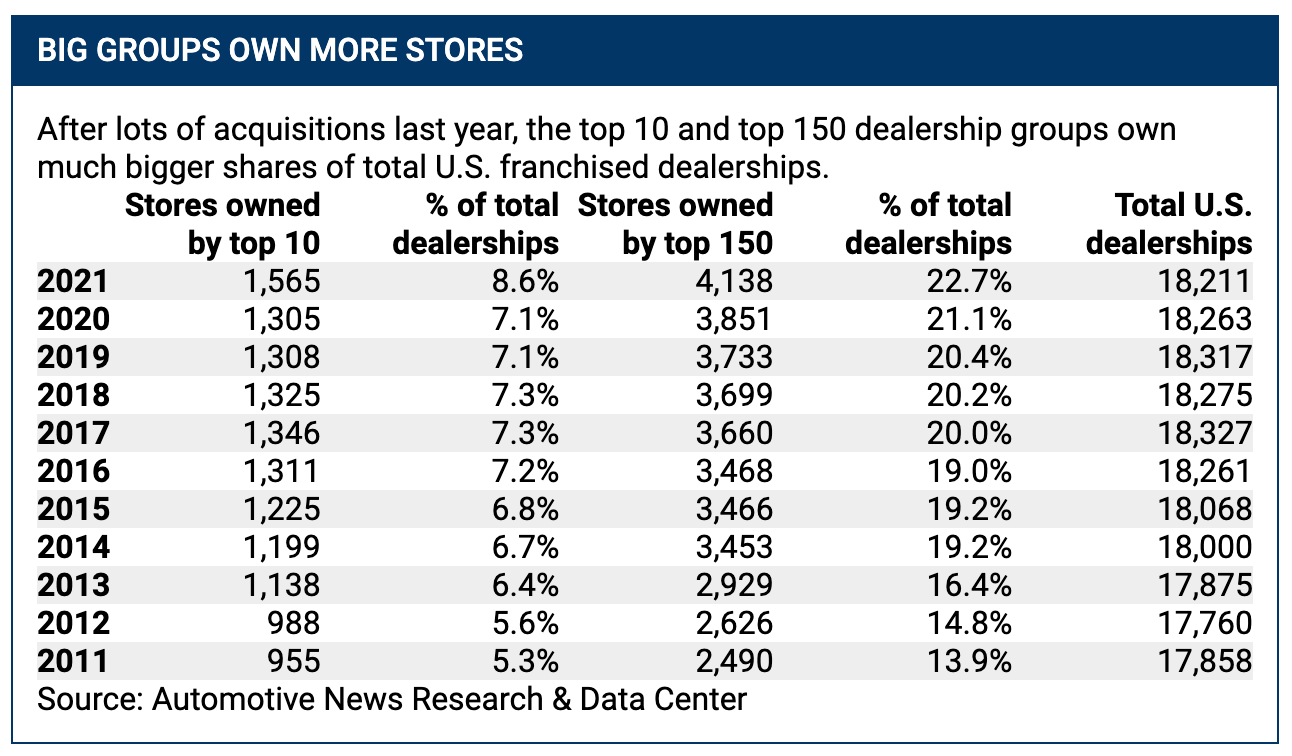You're Not Wrong, Car Dealerships Are Getting Bigger And Bigger
Big dealership groups are buying up more and more dealerships
Dealerships in America keep getting bigger and bigger, with consolidation on the rise. All that and more in The Morning Shift for April 4, 2022.
1st Gear: Consolidation Is Up
The industry trade that is Automotive News reports a lot on the business of car dealerships, and this year's report is that consolidation is continuing unabated. The biggest 10 and 150 dealership groups have just about doubled their share of all the dealerships in the country, according to Auto News data:
AN says to expect more consolidation to come, so the era of the mega dealership group seems to continue unabated. I won't say that I exactly will miss any kind of mom and pop little car dealer, but U can't say that this trend feels good.
2nd Gear: Hertz Is Doubling Down On EVs
I'm not exactly sure how to take this news. On the one hand you could say it's a big fleet sales deal for Polestar. On the other hand, you could say the main news is that we have a major rental car company buying up yet more electric vehicles. Anyway, here are the main details from Automotive News:
Swedish electric automaker Polestar has inked a deal with rental giant Hertz to supply up to 65,000 battery-powered vehicles.The five-year global deal should represent more than $3 billion of potential revenue for the EV startup, a source told Automotive News.
While car rental companies typically demand significant discounts from automakers, Hertz is said to be paying closer to sticker price.
All in all this is probably bad news for EVs in general. I'm not sure anyone gets a good impression of a car from a rental.
3rd Gear: Car Sales Might Be Down, But Demand Is Not
What's restricting sales is supply, not demand, according to another Automotive News report:
As factory problems on three continents continue to disappoint efforts to capture what analysts say is hot pent-up consumer demand, U.S. auto sales plunged 16 percent in the first quarter for the 11 automakers that reported last week.
[...]
But it is hardly a sluggish market. Many retailers have been selling vehicles on a one-in, one-out basis. Almost as soon as a vehicle reaches a dealer's lot, a customer shows up to take delivery.
In this market, "our production pace equals our sales pace," Tyson Jominy, vice president of data and analytics at J.D. Power, told Automotive News.
The pinched sales tally led forecasting firms to revise their sales projections for the full year. LMC Automotive and J.D. Power expect a U.S. light-vehicle sales total of 15.3 million for 2022, down from an earlier forecast of 15.9 million. Cox Automotive also cut its 2022 forecast to 15.3 million from 16 million.
It is still a bad time to buy a new car, I guess, just as it's still a bad time to buy a used car. The right thing to do, of course, is to use the final days of cold weather in much of the country to rush out and buy a bicycle.
In unrelated news I will soon be fixing up and selling some of my used bicycles! Please enjoy buying them.
4th Gear: Just Not For Tesla
Evidence of supply being down and demand staying high is that when carmakers have supply, sales are up. Here's Tesla in Q1, as the New York Times reports:
Tesla, the world's leading electric car company, on Saturday reported a steep increase in worldwide sales in the first three months of the year as it overcame supply chain problems and moved closer to production levels on a par with established luxury carmakers like BMW and Mercedes-Benz.
Tesla said it delivered 310,000 vehicles from January through March, up from 185,000 cars during the same period in 2021, roughly in line with Wall Street's expectations. The nearly 70 percent increase was in contrast with major carmakers like General Motors and Toyota, which reported big sales declines on Friday because of shortages of key components.
5th Gear: I Love This Article Explaining That Making Cars Is Hard
Our publishing platform no longer centers on tags and tagpages, so I will say I miss two of ours used to highlight all of our coverage of the world of electric car startups. There was Shitshow or Scam? where we wondered if new car companies were intentionally misleading investors about how much they could achieve with just another few hundred million dollars or if they themselves were deluded. A lot of Faraday Future coverage ended up here. Then there was Making Cars Is Hard, where we laid out all of the trials and tribulations of Silicon Valley startups sure that they could quickly beat boneheaded industry veterans and ended up sued. A lot of Tesla coverage ended up here.
Anyway, the UK is now getting some of its own EV startups, and that means British publication the Financial Times is catching up to our perspective. Please enjoy this article on Making Cars Is Hard:
Just outside the English market town of Bicester, 15 miles from Oxford, lies the shell of a factory that sits at the forefront of the electric vehicle revolution in the UK. Under a cavernous warehouse ceiling, dozens of gigantic black robotic arms sit poised over the vacant assembly bays, waiting to mass produce electric vans for Arrival, the EV maker start-up.
By autumn, this pristine hub is supposed to begin producing electric vans for UPS, the US parcel delivery group. But already the work is behind schedule. A sister plant in the US will not be ready in time, and so the UK factory will have to shoulder the bulk of this year's production. Arrival now expects to make just 600 vans this year, less than half the number it promised analysts during 2021.
The company is not alone. A plethora of electric vehicle maker wannabes — some opening factories for the first time, and many with steep valuations — are facing their biggest challenge yet: making vehicles. From China's Nio to the Amazon-backed, one-time Wall Street darling Rivian, almost every one of the auto world's feisty new entrants has stumbled at this stage.
Maybe it's time to update our betting guide to startups.
Reverse: MLK Jr. Assassinated
I am still intrigued by how much of the Civil Rights movement centered on transportation — from bus boycotts to marches, all framed against the Great Migration. Anyway, after years of being hounded by the FBI, someone who definitely was not working for the FBI killed Martin Luther King Jr.
Neutral: Whither Dealers?
Without them, who will sponsor our nation's little league teams?

